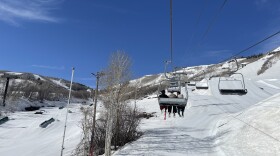Jan. 6 marks day 11 of the Park City Professional Ski Patrol Association’s strike as union members approach two weeks without pay from Vail Resorts.
The union, representing more than 200 patrollers and mountain safety staff, is asking Vail Resorts for increased wages and benefits.
As mediation continues, the union has raised more than $265,000 from 3,500 online donors to help support the workers while on strike.
That’s about $1,300 total per member since they walked out Dec. 27. It does not include Venmo donations or other fundraisers around town.
Visiting skier Peter Oliveri told KPCW time is on Vail’s side, now that the holiday rush has come and gone.
“I'm hoping, but I don't know there’s incentive for Vail to come to an agreement after this weekend,” the New Yorker told KPCW on Silverlode Jan. 4. “The next two weekends are going to be slow.”
Vail and Park City Mountain representatives have maintained they’re committed to reaching an agreement. But the union has filed unfair labor practice charges at the National Labor Relations Board, alleging the company hasn’t been negotiating in good faith since the patrollers’ previous contract expired in April 2024.
If the strike lasts for 15 days, the union’s parent organization, Communications Workers of America, will begin paying members $300 per week. After day 29, the strikers will receive $400 per week, according to CWA’s strike manual.
Skiers told KPCW that Park City Mountain’s crowds and lift lines had improved Jan. 4 and Jan. 5 after extended wait times over Christmas and New Year’s.
One exception was King Con Express Jan. 4, a day when high winds closed the Quicksilver Gondola. King Con was clogged with guests chanting “pay your employees,” and some hiked out rather than wait in line.
The next big ski tourism weekend begins Friday, Jan. 17, ahead of the Martin Luther King Jr. holiday. That would be day 22 of the strike.

During the strike, Park City Mountain is staffing the mountain safety division with employees from other departments, including ski school and food and beverage. The so-called “yellow jackets” are in charge of enforcing rules like speed limits and safe skiing.
“The training is in-house for mountain safety. They don't have medical training,” union business manager Quinn Graves said Jan. 3. “I'm not sure how that would differ, or if they're doing any more in-house training for those folks who are being asked to put on yellow coats, who are usually in different departments.”
As negotiations continue, both sides have requested kindness and respect for all involved.
In a statement Monday, Park City Mountain Vice President and COO Dierdra Walsh spoke out against the harassment of people replacing the strikers.
The union said its members “do not condone harassment of any kind,” adding that local supervisors aren’t allowed to join the union or strike.
The parties say they have tentative agreement on 24 of 27 contract terms, including training and education packages. What remains is wages and benefits.
The union wants base wages for Park City patrollers to rise from $21 to $23 per hour.
The resort says it isn’t as simple as an extra $2. According to resort spokesperson Sara Huey, the union’s wage demand would cost Vail an extra $7 per hour per Park City patroller, not including benefits.
The union has also asked for higher wages for longer-tenured patrollers because it says pay plateaus after five years. But union President Kate Lips told KPCW she still isn’t sure how the resort is calculating the $7 per hour claim.
According to Park City Mountain, its patrollers’ average wage is $25 per hour.
Oliveri, the skier from New York, told KPCW he was “conflicted” about the union’s requests. Also Jan. 4, snowboarder Louis Liu from Atlanta told KPCW the company isn’t paying attention to the patrollers’ needs.
“They literally take care of the mountain and the guests, but Vail is not taking care of them,” he said on Bonanza Express Jan. 4.
Skiers and riders are now asking for refunds, citing long lines and limited terrain during their holiday vacations.
Park City Mountain has admitted its terrain was limited by the strike, which coincided with some of its busiest days this season. It reports about 31% of its 7,300 acres was open as of Jan. 6.

Skiers Jackson and Haley Thomas wrote in an email to Vail that their Canyons Village stay was “completely ruined” by “corporate greed.” They say the company’s salaries are top-heavy.
According to Vail Resorts’ annual report, both CEO Kirsten Lynch and Board of Directors Chair Rob Katz made a base salary in excess of $1 million last fiscal year. Factoring in benefits and stock options, Lynch earns more than $6 million and Katz more than $2 million annually.
Neither has commented publicly on the strike.
After meeting Jan. 6, both sides return to mediation Jan. 7.



